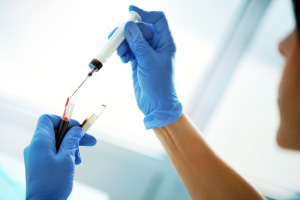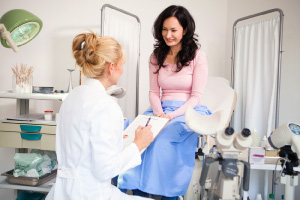Do OB/GYNs Test for STDs?
 If you’re curious whether you have a sexually transmitted disease (STD), it’s good to get tested. Obstetrician-gynecologists (OB/GYNs) offer various tests for STDs. They can also order lab tests. There are some local labs that offer STD testing without the input of a doctor.
If you’re curious whether you have a sexually transmitted disease (STD), it’s good to get tested. Obstetrician-gynecologists (OB/GYNs) offer various tests for STDs. They can also order lab tests. There are some local labs that offer STD testing without the input of a doctor.
If you’re visiting your care provider and you think STI testing is a standard part of women’s health screening, you may be surprised to find that it’s often not included. You’ll need to ask your OB/GYN about including an STD test as part of your health service.
If you think you have an STD, you’re not alone. According to the World Health Organization, STDs are more common than you’d think. Over one million STIs are transmitted daily. Each year, there are over 376 million cases of syphilis, gonorrhea, chlamydia, and trichomoniasis. Over 500 million people live with herpes simplex virus.
Communicate Your STIs to Your Obstetrician Gynecologist
 Communicating your STDs to someone might feel a little embarrassing. But it’s important to know that your doctor wants to help you. Any information that you might deem potentially embarrassing won’t leave the office. It’s illegal. Your private health information is covered under HIPPA law.
Communicating your STDs to someone might feel a little embarrassing. But it’s important to know that your doctor wants to help you. Any information that you might deem potentially embarrassing won’t leave the office. It’s illegal. Your private health information is covered under HIPPA law.
Untreated STIs can result in various health complications:
- infertility
- health problems for an unborn baby
- organ damage
- cancer
- death
Detecting any issues early is the best way to prevent serious health complications from occurring.
STD Testing with an OB/GYN: What You Can Expect
To determine which type of STD test you need, your OB/GYN may ask you questions about:
- Any symptoms you’re experiencing
- If you’ve had an STI in the past
- The number of current sexual partners
- The type of sex you engage in
- The type of protection you use
- If you use drugs that involve needles
Answering these questions honestly will provide the best chances of getting the help you need.
Most of the time, an STI test will involve a urine sample or a blood test, where a doctor analyzes a small sample of your blood to detect an infection.
An HIV test or a gonorrhea test involves a cheek or throat swab, in which the OB/GYN brushes a small soft swab against your cheek or throat to collect cells. To test for herpes simplex virus, you’ll undergo a physical exam of your genital area. The doctor may take a sample of fluid from herpes sores using a swab. If all else fails, the doctor may conduct a genital swab. He or she will use a swab to collect fluid or cells from the vagina, cervix, or anus.
STI testing requires that cells be analyzed in a laboratory. This process can take between two and five days.
Risk Factors Affecting Your STD Testing
 Multiple partners: more than one partner can increase your risk of contracting an STI.
Multiple partners: more than one partner can increase your risk of contracting an STI.- History of unprotected sex: unprotected sex is shown to heighten the risk of acquiring an STD.
- History of STIs: prior exposure to STIs can make you more susceptible to contracting new ones.
Your relationship status, whether you’re pregnant or looking to become pregnant, and sexual history all play a role in how your STI testing is done.
You might not show any symptoms. So getting an STD test is still a viable and safe option. There are over 20 different types of STDs. However, some of the most common include:
Herpes: also known as herpes simplex virus (HSV), is a viral infection that can cause irritating blisters or ulcers. The two main types are oral herpes and genital herpes. Pap Smears are part of regular women’s health screenings and they can detect herpes.
Trichomoniasis: also known as trich, this is a parasitic infection that can be spread through unprotected sex or the use of damp towels.
Syphilis: bacterial STI caused by Treponema pallidum; it’s preventable and curable, but if left untreated, it can cause various, often fatal, health problems with the heart, brain, or nerves.
HIV: human immunodeficiency virus can be contracted from unprotected sex. And if left untreated, it can develop into AIDs, auto-immune deficiency.
Gonorrhea and chlamydia: bacterial sexually transmitted infections that occur through vaginal, anal, or oral sex. Many who contract this disease never see symptoms, but for those who do, it can manifest as frequent or painful urination, abdominal pain, or discharge from the vagina.
Tips for Preventing STIs
 It’s important that you and your partner get tested. Talk to each other about the test results before you have sex.
It’s important that you and your partner get tested. Talk to each other about the test results before you have sex.
A few other great tips for preventing STIs include:
- Practice safe sex by using a condom — the best way to prevent STIs.
- Get vaccinated against HPV and hepatitis B.
- Practice monogamy. Having sex with one partner dramatically reduces the risk of getting STDs.
- Don’t douche, since douching removes the healthy bacteria in the vagina that protects against infections. This practice can increase the risk of getting an STI.
- Stay away from alcohol or drug abuse, since risky behaviors like this put you in dangerous positions of sexual assault or exposure to STIs.
Find an OB/GYN in Kansas City Who You Can Trust
At Northland Women's Health Care in Kansas City, MO, we strive to deliver trustworthy, compassionate, and accurate care. We’ll pair you up with an experienced obstetrician-gynecologist who will help you maintain great health whether you’re pregnant or not. Call us today to schedule an appointment: 816-741-9122.
